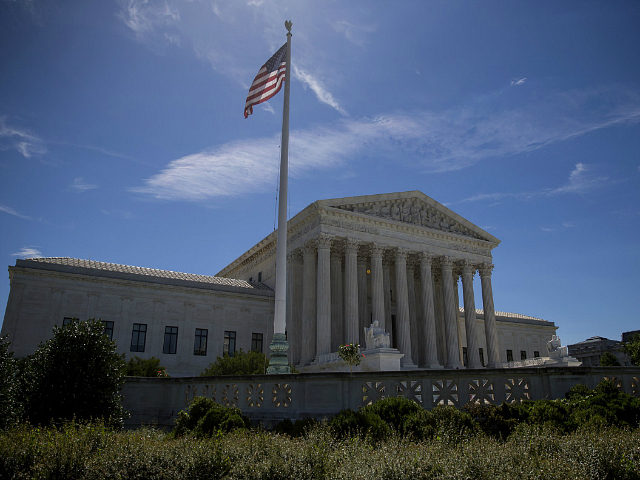WASHINGTON, DC — The Supreme Court on Monday begins an annual term that will tackle a host of hot-button issues, the impact of which the nation will feel for many years to come.
The Supreme Court typically hears slightly more than 70 cases per year and summarily reverses lower courts in several more cases without hearing oral arguments, for a total of close to 80 opinions over a nine-month period. Of the 39 cases the Court has already accepted for review, at least 14 are newsworthy, and six in particular are major cases — with more to be added to the docket in the coming three months.
The six headliner cases at this point are:
1.) Perhaps the most talked-about case for the term at the moment is Masterpiece Cakeshop v. Colorado Civil Rights Commission, where the Supreme Court will consider whether the government’s forcing a Christian baker to customize the design of a wedding cake to celebrate same-sex marriage violates that Christian’s rights under either the Free Speech Clause or the Free Exercise Clause of the First Amendment.
2.) In Janus v. AFSCME, the Court will determine whether forcing government employees to pay union fees that go to collective-bargaining arrangements violates their free-speech rights under the First Amendment. If the Court sides with the employees (as is expected), this will be a major blow to unions and overrule a major 1977 pro-union case. This case has significations implications for unions’ ability to fund left-wing political activities as well.
3.) In Carpenter v. United States, the justices will decide whether taking without a search warrant the cell phone tower data that records the movements of individual cell phone users violates the Fourth Amendment. This could be a seminal case in determining what the Constitution requires in terms of personal privacy in light of newer technologies.
4.) In Gill v. Whitford, the Supreme Court will examine at what point politics play such a large role — when lawmakers make political calculations in drawing legislative redistricting plans after each census — that the plan is a “political gerrymander” that violates the Equal Protection Clause of the Fourteenth Amendment. Another issue in that case is whether such claims are never justiciable in court because it is impossible to effectively remove politics from politicians’ decision-making.
5.) In Collins v. Virginia, the justices will determine whether the Fourth Amendment allows police officers to approach a vehicle parked next to a house on private property without a search warrant. The Court has previously held that there is an “automobile exception” to the Constitution’s usual warrant requirement because it would be impractical to get a judge to issue a search warrant every time a police officer approaches a car. The question here is whether that exception applies when the car is actually next to a home that would clearly be protected by the Fourth Amendment.
6.) And in the only piece that rivals Masterpiece Cakeshop in blockbuster news value, in Trump v. IRAP, the Court will consider whether President Donald Trump’s Executive Order 13780 — the temporary travel ban from six terror-prone nations and its cap on refugees entering this country — is illegal either under federal law or the Constitution’s Establishment Clause. Now that the timeframe for those issues has expired, a second issue is whether these consolidate challenges are now moot, in which case the Court may not even hear argument and simply throw out the case.
There are many more noteworthy cases, several of which were 4-4 tie votes last term before Justice Neil Gorsuch was confirmed as the successor to Justice Antonin Scalia, which the full nine-justice Court will rehear and decide.
For examples of additional cases, Sessions v. Dimaya and Jennings v. Rodriguez involve immigrants — one concerning whether a key provision in federal law for deporting aliens is unconstitutional because it is too vague, and the other determining whether detained aliens must be offered a bond hearing to be released into the American public while their deportation proceedings are ongoing.
Another case that will garner attention is Husted v. A. Philip Randolph Institute, which concerns the legal obligations of states under federal law to clean up their voter rolls to remove ineligible voters.
There are others as well, in addition to dozens of interesting petitions for review that the Supreme Court will vote on in the coming weeks to fill up the remainder of its calendar for the year. Cases involving public prayer, the Second Amendment, free speech in elections, and the reach of Congress’s power through environmental laws are all in the pipeline for consideration.
The Court’s October Term 2017 convenes at 10 a.m. on Monday.
Ken Klukowski is senior legal editor for Breitbart News. Follow him on Twitter @kenklukowski.

COMMENTS
Please let us know if you're having issues with commenting.